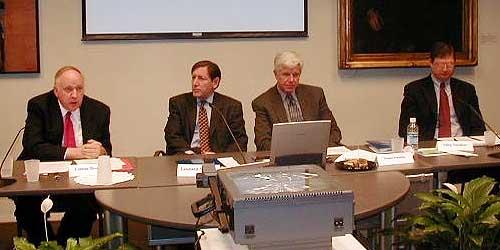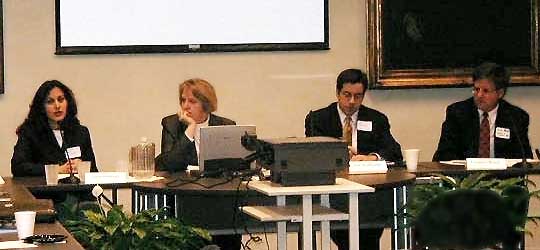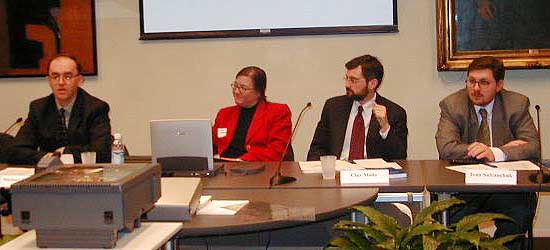April 5, 2002

Left to right: Amb. Linton Brooks (NNSA), Leonard Spector (CNS)
Gen. (Ret.) Thomas Kuenning (DTRA), and Oleg Novikov (Russian Embassy)
Topic: Russian Nuclear Regionalism and Challenges for US Nonproliferation Assistance Programs
On April 5, 2002, the Center for Nonproliferation Studies (CNS) at the Monterey Institute of International Studies held the workshop in Washington, DC. The meeting marked the conclusion of a two-year study devoted to regional dimensions of nuclear safety and security in Russia conducted by CNS in cooperation with the Moscow-based Center for Policy Studies in Russia (PIR Center), along with experts from several other organizations. Over 70 people participated in the April 5 workshop, including senior officials from the US Departments of Energy, State, and Defense, foreign diplomats, Congressional staff, representatives of the General Accounting Office, analysts from a number of non-governmental organizations (NGOs), and journalists.
At the meeting, members of the research team presented their findings regarding regional nuclear issues and provided recommendations aimed at improving the effectiveness of future US nonproliferation assistance programs focusing on regional facilities. The researchers’ case studies cited extensively from regional media as well as interviews with officials and analysts in the following five federal districts: the Russian Northwest, the Volga region, the Urals, Siberia, and the Far East. At the workshop, the discussion focused on the regional causes of control problems at civilian and military facilities housing nuclear materials, including the influence of regional governments and economic actors on decision-making at the local level, as well as the impact of organized crime.
An introductory segment of the workshop covered overarching issues related to center-periphery relations under President Vladimir Putin.

Left to right: Sonia Ben Ouagrham (CNS), Elena Sokova (CNS)
Jon Wolfsthal (Carnegie Endowment), and Gregory Brock (Georgia Southern University).
The three sessions examined:
- The role of Minatom and the status of conditions in the closed nuclear cities.
- The role of the military and the status of nuclear safety on regional military bases.
- The status of US nonproliferation assistance programs in Russia’s regions.
Summary Papers
- “The ‘Federal Face’ of Nuclear Regionalism: From Spent Force to Spent Fuel,”
Adam N. Stulberg, Georgia Institute of Technology - “Minatom’s Regional Policy: Rumiantsev, One Year Later,”
Sonia Ben Ouagrham, CNS - “Public Finance in the Closed Cities of Russia,”
Gregory Brock, Georgia Southern University - “The Closed Nuclear Cities: Federal Control vs. Local and Regional Influences,”
Elena Sokova, CNS - “Russian Military Regionalism,”
Michael Jasinski, CNS - “Nuclear Regionalism in the Russian Far East,”
Cristina Chuen, CNS - “Russia’s Northwest: Problems and Achievements at Military Facilities,”
Ivan Safranchuk, Center for Defense Information
Speakers
While the speakers agreed that Putin’s federal reforms in 2000 have weakened regional independence movements and established stronger central political controls, they also noted that the economic and regulatory disarray within the nuclear complex remains. This uncertainty creates conditions permitting extensive negative regional influences on the operation of nuclear facilities, including power shortages, high crime and drug abuse rates, local political corruption, environmental problems, and other factors. Speakers argued that regional facilities represent the weakest link in the protection of sensitive nuclear assets and will require further attention from both Moscow and foreign assistance providers. According to Margot Mininni from the Department of Energy’s Nuclear Cities Initiative, these conditions and the complex economic and political factors behind them provide “challenging waters” through which assistance programs must navigate.
Panel Discussion
On the final panel, the Department of Energy’s Linton Brooks, head of defense nuclear nonproliferation at the National Nuclear Security Administration, spoke of the shared concern Russia and the United States have in safeguarding fissile material after September 11 and the close cooperation that has stemmed from the new strategic relationship between the two sides. He also noted the very favorable support of Congress for these initiatives. Gen. (ret.) Thomas Kuenning, director of the Pentagon’s Cooperative Threat Reduction Directorate, echoed these remarks and noted US progress in fulfilling its four lead objectives in Russia.
US lead objectives in Russia:
- Weapons elimination
- Securing nuclear weapons
- Increasing transparency
- Promoting military-to-military contacts to prevent proliferation
Russian Embassy representative Oleg Novikov said that warmer relations between the United States and Russia after the September 11 attacks had helped facilitate cooperative efforts to secure nuclear weapons and fissile materials, but that more work remains. He expressed hope that new non-governmental programs like the Nuclear Threat Initiative might be able to fill the gap in addressing some areas (such as housing for military officers and conversion of facilities) where government funding has been limited. The panelists reviewed major current assistance programs and discussed prospects for their expansion.

Left to right: Michael Jasinski (CNS), Cristina Chuen (CNS)
Clay Moltz (CNS), Ivan Safranchuk (CDI, Moscow office)
Publication
Analysts from CNS and the PIR Center will be updating and finalizing their studies in the next few months—based on comments at the meeting—for inclusion in a book manuscript (Nuclear Regionalism in Russia: Managing Fissile Material and the Weapons Complex under the New Federalism) to be published next year.
Agenda
| 8:30-8:40 | Introduction and Opening Remarks | Dr. Clay Moltz, CNS |
| 8:40-9:00 | Key Actors in Russian Center-Periphery Relations | Dr. Vladimir Orlov, PIR Center |
| 9:00-9:20 | Current Politics of Regionalism in Russia | Dr. Adam Stulberg, Georgia Institute of Technology |
| Session One | Chair: Jon Wolfsthal, Carnegie Endowment | |
|---|---|---|
| 9:20-9:40 | Minatom’s Regional Policy (and Nuclear Issues at the Federal Level) | Dr. Sonia Ben Ouagrham, CNS |
| 9:40-10:00 | Economic Status of the Closed Cities | Dr. Gregory Brock, Georgia Southern University |
| 10:00-10:20 | The Closed Nuclear Cities: Federal Control vs. Local and Regional Influences | Elena Sokova, CNS |
| 10:20-10:40 | Implementation of the NCI Program in Russia’s Closed Cities | Margot Mininni, U.S. Department of Energy |
| 10:40-11:00 | Discussion | |
| 11:00-11: 15 | Coffee Break | |
| Session Two | Chair: Dr. Clay Moltz, CNS | |
| 11:15-11:35 | The Military and Russia’s Regions | Michael Jasinski, CNS |
| 11:35-11:55 | Russia’s Northwest: Problems and Achievements at Military Facilities | Ivan Safranchuk, CDI, Moscow Office |
| 11:55-12:15 | Russia’s Far East: Problems and Achievements at Military Facilities | Cristina Chuen, CNS |
| 12:15-12:30 | Discussion | |
| 12:30-12:45 | Lunch (Buffet) | |
| Session Three | Chair: Leonard Spector, CNS | |
| 12:45-1:05 | Status of DOE Programs in Russia | Amb. Linton Brooks, U.S. Department of Energy |
| 1:05-1:25 | U.S. Implementation of CTR Programs in Russia’s Regions | Gen. Thomas Kuenning, U.S. Defense Department |
| 1:25-1:45 | Russian View on U.S. CTR and DOE Programs | Oleg Novikov, Russian Embassy |
| 1:45-2:00 | Discussion | |
CNS thanks the Smith Richardson Foundation for a grant in support of this project, as well as the following foundations for general support of its programs in the newly independent states: the Carnegie Corporation, the Ford Foundation, the John D. and Catherine T. MacArthur Foundation, the John Merck Fund, the Prospect Hill Fund, and the Scherman Foundation.
